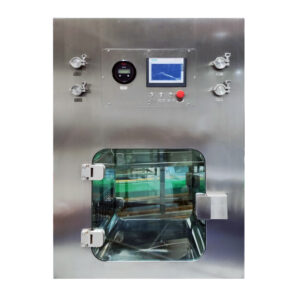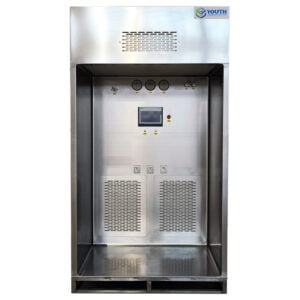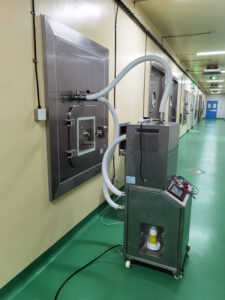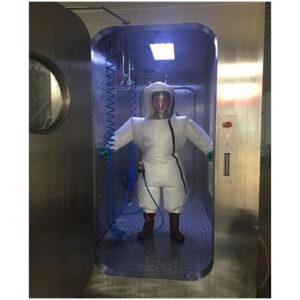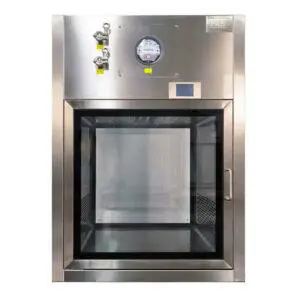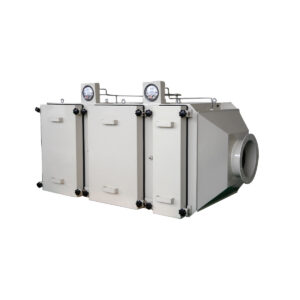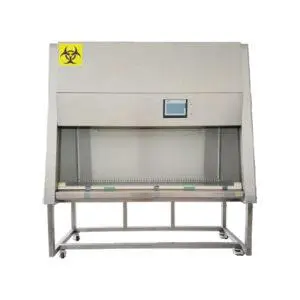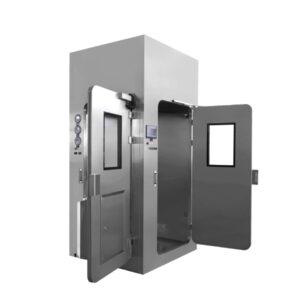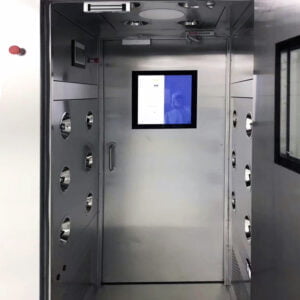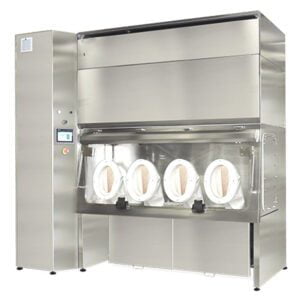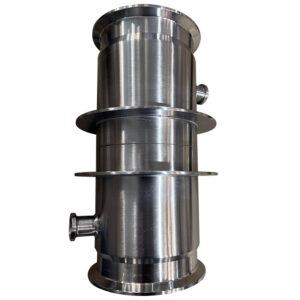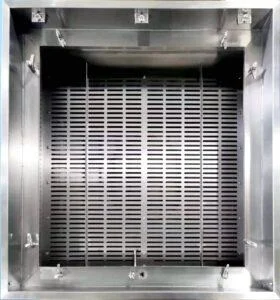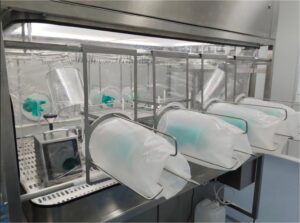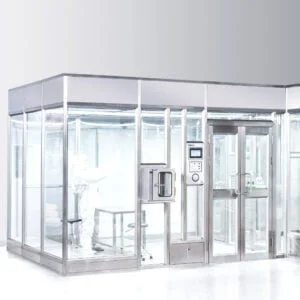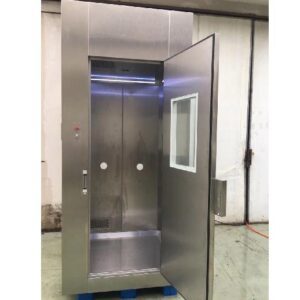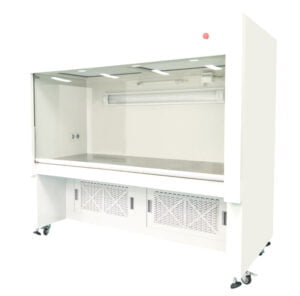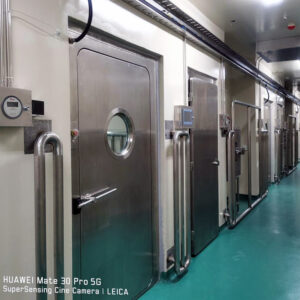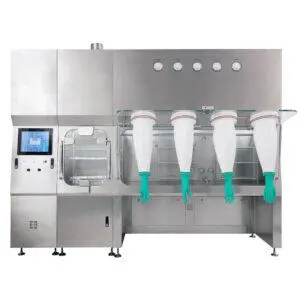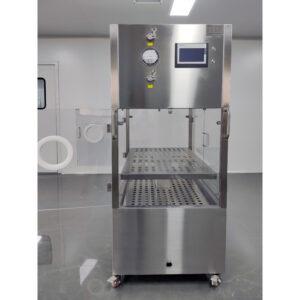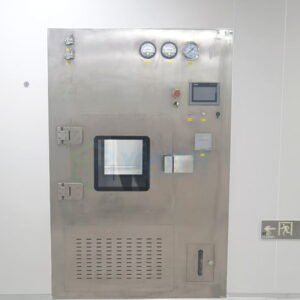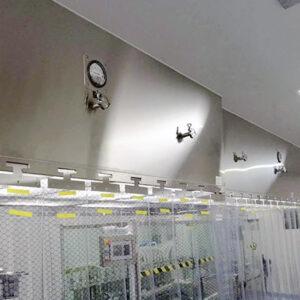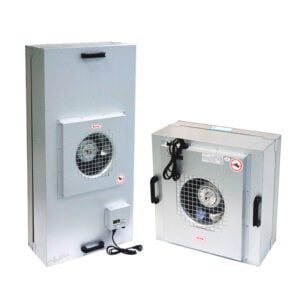In the world of cleanrooms and controlled environments, maintaining sterility is paramount. One crucial technology that plays a significant role in this arena is the Bag In Bag Out (BIBO) system. These ingenious systems have revolutionized the way we approach filter replacement and contamination control in sensitive environments. From pharmaceutical laboratories to semiconductor manufacturing facilities, BIBO systems have become an indispensable tool in the fight against cross-contamination.
BIBO systems are designed to allow for the safe removal and replacement of contaminated filters without exposing the surrounding environment to potential hazards. This innovative approach not only protects the integrity of cleanrooms but also safeguards the health of personnel involved in filter maintenance. By creating a sealed environment during the filter change process, BIBO systems effectively prevent the release of harmful particles and maintain the sterility of critical spaces.
As we delve deeper into the world of BIBO systems, we'll explore their fundamental principles, applications across various industries, and the crucial role they play in maintaining the highest standards of cleanliness and safety. From their design intricacies to their practical implementation, we'll uncover how these systems have become a cornerstone in the prevention of cross-contamination.
"BIBO systems are an essential component in maintaining the integrity of cleanroom environments, effectively preventing cross-contamination during filter replacement procedures."
| Feature | BIBO Systems | Traditional Filter Change |
|---|---|---|
| Containment | Sealed bag system | Open air exposure |
| Risk of contamination | Minimal | High |
| Personnel safety | Enhanced | Potential exposure |
| Downtime | Reduced | Potentially longer |
| Compliance with regulations | Easier to achieve | More challenging |
| Cost-effectiveness | Higher initial cost, long-term savings | Lower initial cost, potential for higher long-term expenses |
How do BIBO systems function to prevent cross-contamination?
BIBO systems operate on a simple yet ingenious principle: they create a sealed environment around the filter during the replacement process. This containment method ensures that potentially hazardous particles trapped in the filter do not escape into the surrounding area. The process begins with attaching a specially designed bag to the housing of the contaminated filter. Once secured, the filter can be safely removed and placed inside the bag without any contact with the external environment.
The key to BIBO systems lies in their ability to maintain a continuous barrier between the contaminated filter and the clean environment. This is achieved through a series of carefully designed steps that ensure the integrity of the containment throughout the entire replacement process. From the initial attachment of the bag to the final sealing and removal, every stage is engineered to minimize the risk of particle release.
"The BIBO system's design ensures a complete seal between the contaminated filter and the cleanroom environment, effectively eliminating the risk of particle release during filter changes."
| Component | Function |
|---|---|
| Containment bag | Provides a sealed environment for filter removal |
| Safety straps | Secures the bag to the housing |
| Filter housing | Designed for easy attachment of containment bag |
| Glove ports | Allow for safe manipulation of filter within the bag |
What industries benefit most from BIBO system implementation?
BIBO systems find their most critical applications in industries where maintaining a sterile environment is crucial. The pharmaceutical industry, for instance, relies heavily on these systems to ensure the purity of their products and the safety of their manufacturing processes. In pharmaceutical cleanrooms, even the slightest contamination can lead to catastrophic consequences, making BIBO systems an indispensable tool in maintaining regulatory compliance and product quality.
Similarly, the semiconductor industry, with its need for ultra-clean environments, has embraced BIBO systems as a standard practice. The manufacturing of microchips and other sensitive electronic components requires an environment free from even the tiniest particles, making the containment provided by BIBO systems essential. ['YOUTH'] offers state-of-the-art BIBO solutions that cater to these high-demand industries, ensuring uncompromised cleanliness and safety.
Beyond these, numerous other sectors benefit from BIBO technology. Research laboratories, especially those dealing with hazardous materials or conducting sensitive experiments, rely on these systems to maintain the integrity of their work environments. The food and beverage industry, while not always requiring the same level of sterility, also employs BIBO systems in certain critical areas to prevent contamination and ensure product safety.
"BIBO systems have become a standard practice in industries requiring the highest levels of cleanliness, from pharmaceuticals to semiconductor manufacturing, ensuring product integrity and personnel safety."
| Industry | Primary Benefit of BIBO Systems |
|---|---|
| Pharmaceutical | Maintains product purity and regulatory compliance |
| Semiconductor | Ensures ultra-clean environment for sensitive components |
| Research laboratories | Protects experiments and personnel from contamination |
| Food and beverage | Prevents product contamination in critical areas |
How do BIBO systems enhance worker safety during filter changes?
One of the most significant advantages of BIBO systems is the enhanced safety they provide to workers involved in filter maintenance. Traditional filter replacement methods often expose personnel to potentially harmful particles trapped in contaminated filters. BIBO systems eliminate this risk by creating a sealed environment that prevents direct contact between the worker and the filter contents.
The design of BIBO systems incorporates features specifically aimed at protecting worker health. Glove ports built into the containment bags allow personnel to manipulate the filter without breaking the seal, ensuring that any hazardous materials remain contained. This not only protects the immediate health of the workers but also reduces the long-term risks associated with repeated exposure to potentially harmful substances.
Furthermore, BIBO systems often include additional safety features such as viewing windows and secure fastening mechanisms. These elements allow workers to visually inspect the filter and ensure proper handling without compromising the containment. The result is a safer work environment that not only protects individual health but also contributes to overall workplace safety standards.
"BIBO systems significantly reduce the risk of worker exposure to hazardous materials during filter changes, creating a safer work environment and reducing long-term health risks."
| Safety Feature | Purpose |
|---|---|
| Glove ports | Allow safe manipulation of filter |
| Viewing window | Enables visual inspection without breaking seal |
| Secure fasteners | Ensure containment integrity |
| Double-bagging option | Provides additional layer of protection |
What role do BIBO systems play in regulatory compliance?
In industries governed by strict regulatory standards, BIBO systems play a crucial role in achieving and maintaining compliance. Regulatory bodies such as the FDA in the pharmaceutical industry and various environmental agencies set stringent guidelines for contamination control and worker safety. BIBO systems, with their proven effectiveness in preventing cross-contamination, often form a key part of compliance strategies.
The use of BIBO systems can significantly simplify the process of demonstrating regulatory compliance. Their consistent and documented approach to filter changes provides a clear audit trail, making it easier for companies to prove their adherence to cleanliness and safety standards. This documentation can be particularly valuable during inspections or when seeking certifications.
Moreover, as regulatory standards continue to evolve and become more stringent, BIBO systems offer a future-proof solution. Their adaptable design and proven effectiveness mean that they can often meet or exceed new requirements without the need for significant changes to existing infrastructure. This adaptability not only ensures ongoing compliance but also provides a cost-effective long-term solution for contamination control.
"BIBO systems are instrumental in achieving and maintaining regulatory compliance, offering a documented and consistent approach to contamination control that satisfies stringent industry standards."
| Regulatory Aspect | BIBO System Contribution |
|---|---|
| Contamination control | Provides verifiable containment method |
| Worker safety | Reduces exposure risk, meeting OSHA standards |
| Documentation | Offers clear audit trail for inspections |
| Adaptability | Meets evolving regulatory requirements |
How do BIBO systems compare to alternative filter change methods?
When comparing BIBO systems to alternative filter change methods, the advantages become clear. Traditional methods often involve direct handling of contaminated filters, which not only poses risks to workers but also increases the likelihood of contamination spreading to the surrounding environment. BIBO systems, on the other hand, provide a contained and controlled process that significantly reduces these risks.
One of the key differences lies in the level of exposure during the filter change process. While traditional methods may require extensive preparation of the area and personal protective equipment for workers, BIBO systems minimize the need for such measures. The containment provided by the bag system means that the filter can be changed with minimal disruption to the surrounding environment, often allowing nearby operations to continue uninterrupted.
Another significant advantage of BIBO systems is their consistency. The standardized process of attaching the bag, removing the filter, and sealing the containment ensures that each filter change is performed with the same level of safety and efficiency. This consistency not only improves overall safety but also contributes to more predictable maintenance schedules and resource allocation.
"BIBO systems offer superior contamination control and worker safety compared to traditional filter change methods, providing a consistent and efficient process that minimizes environmental disruption."
| Aspect | BIBO Systems | Traditional Methods |
|---|---|---|
| Contamination risk | Minimal | Higher |
| Worker exposure | Limited | Potentially significant |
| Process consistency | High | Variable |
| Operational disruption | Minimal | Often substantial |
| Training requirements | Standardized | May vary |
What are the long-term benefits of implementing BIBO systems?
The implementation of BIBO systems offers numerous long-term benefits that extend beyond immediate contamination control. One of the most significant advantages is the reduction in downtime associated with filter changes. The efficient and contained process allows for quicker filter replacements, minimizing the impact on production or research activities. Over time, this increased efficiency can translate into substantial cost savings and improved productivity.
Another long-term benefit is the enhanced protection of expensive equipment and sensitive products. By preventing the release of contaminants during filter changes, BIBO systems help maintain the integrity of cleanroom environments. This protection extends the lifespan of sensitive equipment and reduces the risk of product contamination, potentially saving companies significant amounts in replacement costs and product losses.
Furthermore, the use of BIBO systems can contribute to a company's reputation for quality and safety. In industries where cleanliness and contamination control are paramount, the adoption of advanced systems like BIBO demonstrates a commitment to best practices. This can be a valuable asset in attracting clients, passing audits, and maintaining a competitive edge in the market.
"The long-term benefits of BIBO systems include reduced downtime, enhanced equipment protection, and improved company reputation, leading to significant cost savings and competitive advantages."
| Long-term Benefit | Impact |
|---|---|
| Reduced downtime | Increased productivity and cost savings |
| Equipment protection | Extended lifespan of sensitive machinery |
| Product integrity | Reduced risk of contamination-related losses |
| Reputation enhancement | Improved market position and client trust |
| Regulatory compliance | Easier adherence to evolving standards |
How are BIBO systems evolving to meet future challenges?
As industries continue to advance and face new challenges, BIBO systems are evolving to meet these changing needs. One area of development is in the materials used for containment bags. Manufacturers are exploring more durable and environmentally friendly options that maintain the same level of protection while reducing environmental impact. This includes research into biodegradable materials that don't compromise on containment effectiveness.
Another focus of evolution is in the integration of smart technologies. Future BIBO systems may incorporate sensors and IoT capabilities to monitor filter performance, predict maintenance needs, and even automate parts of the replacement process. This could lead to more proactive maintenance strategies, further reducing downtime and improving overall system efficiency.
Advancements in design are also making BIBO systems more adaptable to various environments and filter types. Modular designs that can be easily customized for different applications are becoming more common, allowing for greater flexibility in implementation across diverse industries and settings.
"The future of BIBO systems lies in smarter, more sustainable designs that offer enhanced monitoring capabilities and greater adaptability to diverse industrial needs."
| Future Development | Potential Impact |
|---|---|
| Smart sensors | Predictive maintenance and automated monitoring |
| Sustainable materials | Reduced environmental impact |
| Modular designs | Greater adaptability across industries |
| Automated features | Enhanced efficiency and reduced human error |
| Integration with cleanroom systems | Improved overall contamination control |
Conclusion
BIBO systems have proven to be invaluable assets in the fight against cross-contamination across a wide range of industries. Their ability to provide a sealed, controlled environment for filter changes not only protects the integrity of cleanrooms and sensitive environments but also significantly enhances worker safety. As we've explored, the benefits of BIBO systems extend far beyond immediate contamination control, offering long-term advantages in efficiency, compliance, and cost-effectiveness.
From pharmaceuticals to semiconductors, research laboratories to food production facilities, BIBO systems have become a cornerstone of contamination prevention strategies. Their consistent performance, adaptability to evolving regulatory standards, and potential for future innovations make them a sound investment for any industry where cleanliness is paramount.
As we look to the future, the continued evolution of BIBO systems promises even greater benefits. With advancements in materials, smart technologies, and design flexibility, these systems are well-positioned to meet the emerging challenges of contamination control. By embracing BIBO technology, industries can ensure they are well-equipped to maintain the highest standards of cleanliness, safety, and product integrity in an increasingly demanding world.
External Resources
Maintaining Purity: BIBO's Critical Role in Cleanrooms – This article explains how BIBO systems prevent cross-contamination by safely replacing contaminated filters in cleanroom environments, ensuring the integrity of the sterile space and protecting workers from hazardous materials.
Bag In Bag Out – BIBO – This resource details the BIBO method for safely replacing HEPA filters, emphasizing the containment process that prevents the release of contaminants, thus preventing cross-contamination in sensitive environments.
BIBO Bag In Bag Out System Application – This article highlights the applications of BIBO systems in various industries, including pharmaceutical, semiconductor, and biomedical research, focusing on how these systems prevent cross-contamination by safely handling hazardous filters.
Air Quality and Surface Decontamination – How HEPA Filters, UVC Lights, and Portable HEPA Systems Reduce Contamination – This blog post discusses the role of BIBO modules in integrating with HEPA filter systems to ensure safe and contact-free removal of filters containing potentially hazardous airborne contaminants, thereby preventing cross-contamination.
Cross-Contamination Prevention in the Food & Beverage World – Although not exclusively about BIBO systems, this article provides a broader context on cross-contamination prevention, including practices that can be complemented by the use of BIBO systems in certain industrial settings to maintain cleanliness and safety.
Bag-In-Bag-Out (BIBO) Systems for Safe Filter Replacement – This resource provides detailed information on BIBO systems, their design, and functionality, emphasizing their role in safely replacing filters without exposing the environment or personnel to contaminants, thus preventing cross-contamination.
BIBO Systems: Ensuring Cleanroom Integrity and Safety – This article focuses on the critical role BIBO systems play in maintaining cleanroom integrity and safety, particularly in the pharmaceutical industry, by preventing the escape of contaminants during filter replacement.
Cleanroom Filter Replacement: The Importance of BIBO Systems – This article discusses the importance of BIBO systems in cleanroom environments, highlighting how these systems ensure safe and contamination-free filter replacement, which is crucial for preventing cross-contamination.
Related Contents:
- Bag-In/Bag-Out (BIBO) Systems: Operation and Maintenance Guide
- The Cost-Effectiveness of BIBO Systems in Industrial Applications
- Introduction
- Unveiling the Power of Bag-In-Bag-Out Systems
- Nuclear Safety Revolution: BIBO Systems Enhance Protection
- Safeguarding Health: The Role of BIBO Systems in Workplace Safety
- Evaluating BIBO Systems’ Efficiency in Particle Removal
- Implementing BIBO Systems in Biotechnology Research Labs
- The Intricate World of BIBO Filter Housing



